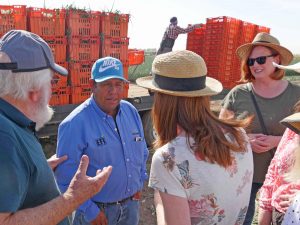Meet the People Behind EFI: Carol Schrader, Vice-Chair of the EFI Board
 Carol Schrader is the current vice-chair and holds one of three independent seats on the multi-stakeholder governing body for Equitable Food Initiative (EFI). Schrader is an entrepreneur, technology consultant and former software executive with over 30 years of experience in the tech startup industry. She’s also an Astia angel investor and advisor who supports women-led business ventures. Schrader brings insight in raising capital, strategic planning, marketing and executive management to the board.
Carol Schrader is the current vice-chair and holds one of three independent seats on the multi-stakeholder governing body for Equitable Food Initiative (EFI). Schrader is an entrepreneur, technology consultant and former software executive with over 30 years of experience in the tech startup industry. She’s also an Astia angel investor and advisor who supports women-led business ventures. Schrader brings insight in raising capital, strategic planning, marketing and executive management to the board.
We asked Schrader about her perspective on the impact EFI is making in the fresh produce industry.
I really feel that there is true impact. I’ve felt it, I’ve seen it and I’ve heard it from the farmworkers.” Carol Schrader
Can you tell us about your role as an independent board member?
I appreciate all the different stakeholders that come to the table and that I get to learn from all those different perspectives. As an independent board member, I wouldn’t say I’m necessarily the consumer’s representative, but I do think of things differently because I haven’t come out of either the grower side, retailer side or one of the long-standing organizations that have been supporting farmworkers.
I take a different view when looking at the data, the budgets, how money is being spent and the markers of progress. I also have a view of helping the organization scale. So I’m constantly looking at metrics, processes or technology solutions that are internal to EFI to assess if the organization could be more productive.
 What is it about EFI’s work that you find most compelling?
What is it about EFI’s work that you find most compelling?
Because of my background growing up on a family farm, I have a soft spot in my heart for farming and agriculture. The fresh produce farms certified by EFI are very different than the corn and soybean farms in my family, but I still relate to the farmworker in the story.
What touches me the most are the opportunities to meet with Leadership Teams and farmworkers on EFI-certified farms. The teams get to share what EFI has meant to their organization, to their work lives and even to their personal lives. That really brings it home to me, that EFI is truly changing people’s lives.
It’s an organization trying to transform a long-standing and traditional industry by bringing it into current trends and business practices. That’s a slow process, but hearing the stories from the farmworkers and the growers who participate in the program about the changes that they’ve seen, culturally, personally and financially—it’s seeing the true impact of EFI. I’ve been on a lot of nonprofit boards and worked with a lot of nonprofits and that’s not always the case. I really feel that there is true impact. I’ve felt it, I’ve seen it and I’ve heard it from the farmworkers.
As an angel investor who supports women-led business ventures, how do you see women’s agency supported through the work of EFI?
Though I hadn’t understood it in these terms before getting involved, one way EFI is encouraging equity is by removing obstacles specific to women or by giving women opportunities that aren’t otherwise available to them.
Farmworkers have a challenging life, and women farmworkers face a specific set of challenges. We’ve all heard the stories of sexual harassment and sexual aggression that happen in the fields. That’s not OK and, it’s not OK to treat people of either gender poorly.
EFI has helped to elevate and also bring equity to women’s needs and issues on the farm because of the EFI Standards and certification process which includes establishing a Leadership Team. The number of Leadership Teams that have women as leaders is significant. To see these women running teams comprised of both men and women in large farming operations is exciting. The dynamics these teams create have changed the playing field for women as a result of going through the certification process, increasing awareness to the growers and to their co-workers that they have different needs that need to be met. Safety and security are fundamental needs. In order for them to do their jobs well, they need to feel secure and safe. I think the EFI Leadership Teams have empowered women farmworkers to speak up and stand up.
How have you seen company culture affect success in your career in the tech startup industry? How does this translate to EFI’s work in the Ag industry?
I really feel that common goals and a core set of values are the contributors to success. When I’ve seen success, it’s when I’ve been involved with companies where we all understood the goals of the company. Thus, we could be independently empowered to act, to decide and to move forward on a day-to-day basis. When goals are clear, a great teamwork environment can be created, wins are celebrated by everyone and the company feels like a place you want to be.
I’ve also seen the converse. When the goals aren’t set and they’re conflicting or they change frequently—flavor of the day, flavor of the month—that affects the values, people don’t understand, truth isn’t there, they don’t feel like they’re on the same team, and it just starts to degrade.
In regard to EFI’s work, establishing common goals and a core set of values comes through in what the EFI Program helps farmworkers and growers create. A farm is nothing without the people, the employees. Much the same as in a tech startup, the employees of a farm on all levels need to be brought into the success of the company as a whole. They need to see and feel that their success is tied to the company’s success and EFI training creates pathways to make that possible.
For more information on the multi-stakeholder board, EFI certification process and EFI Standards, visit www.equitablefood.org.

